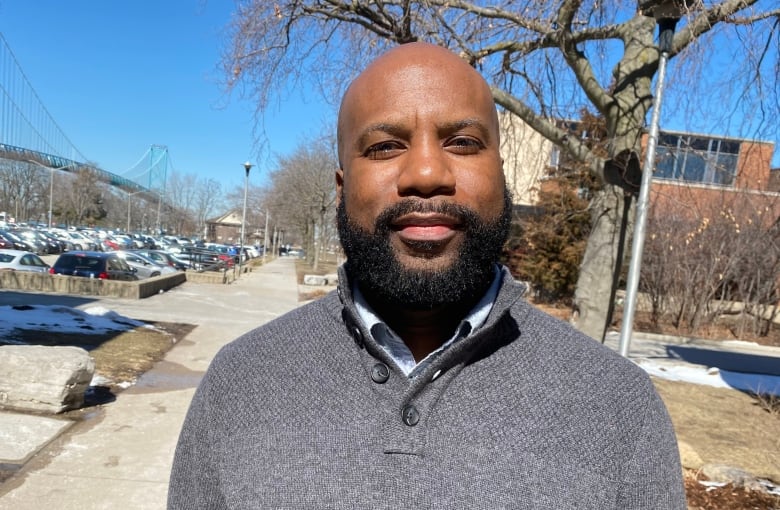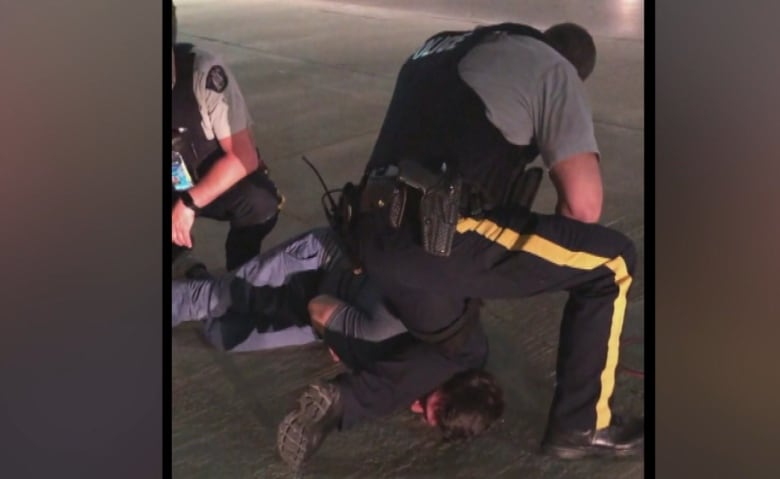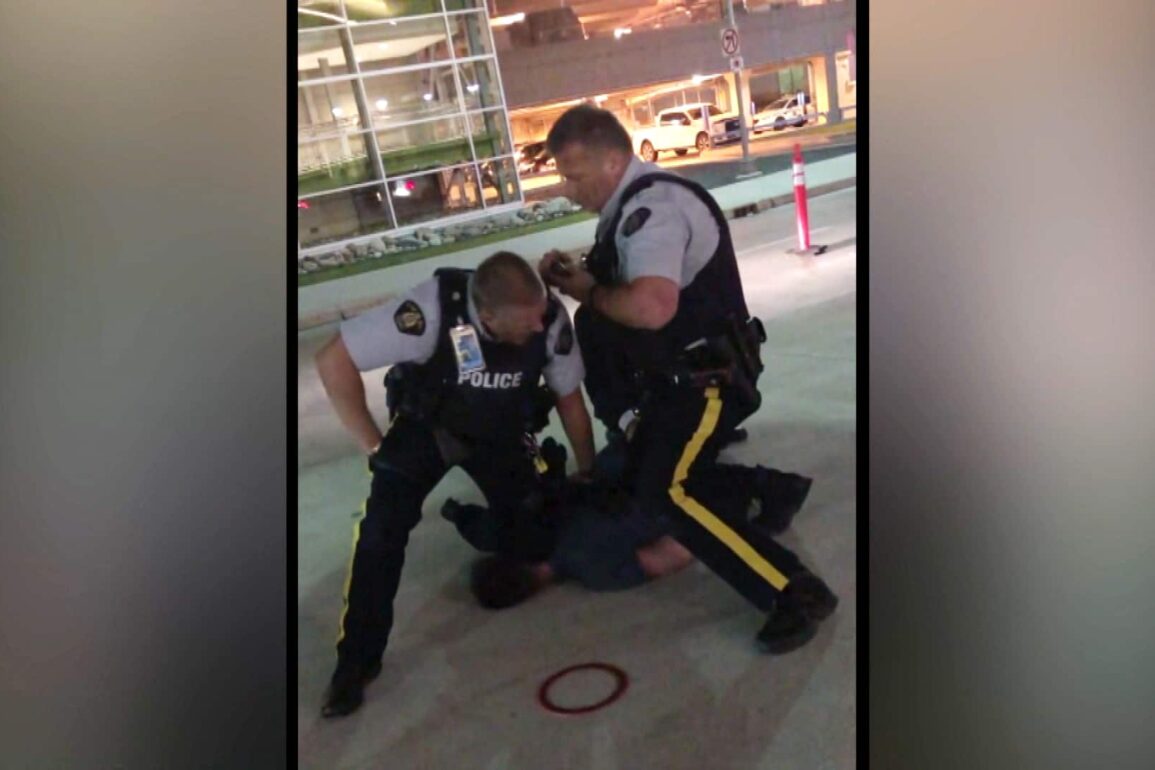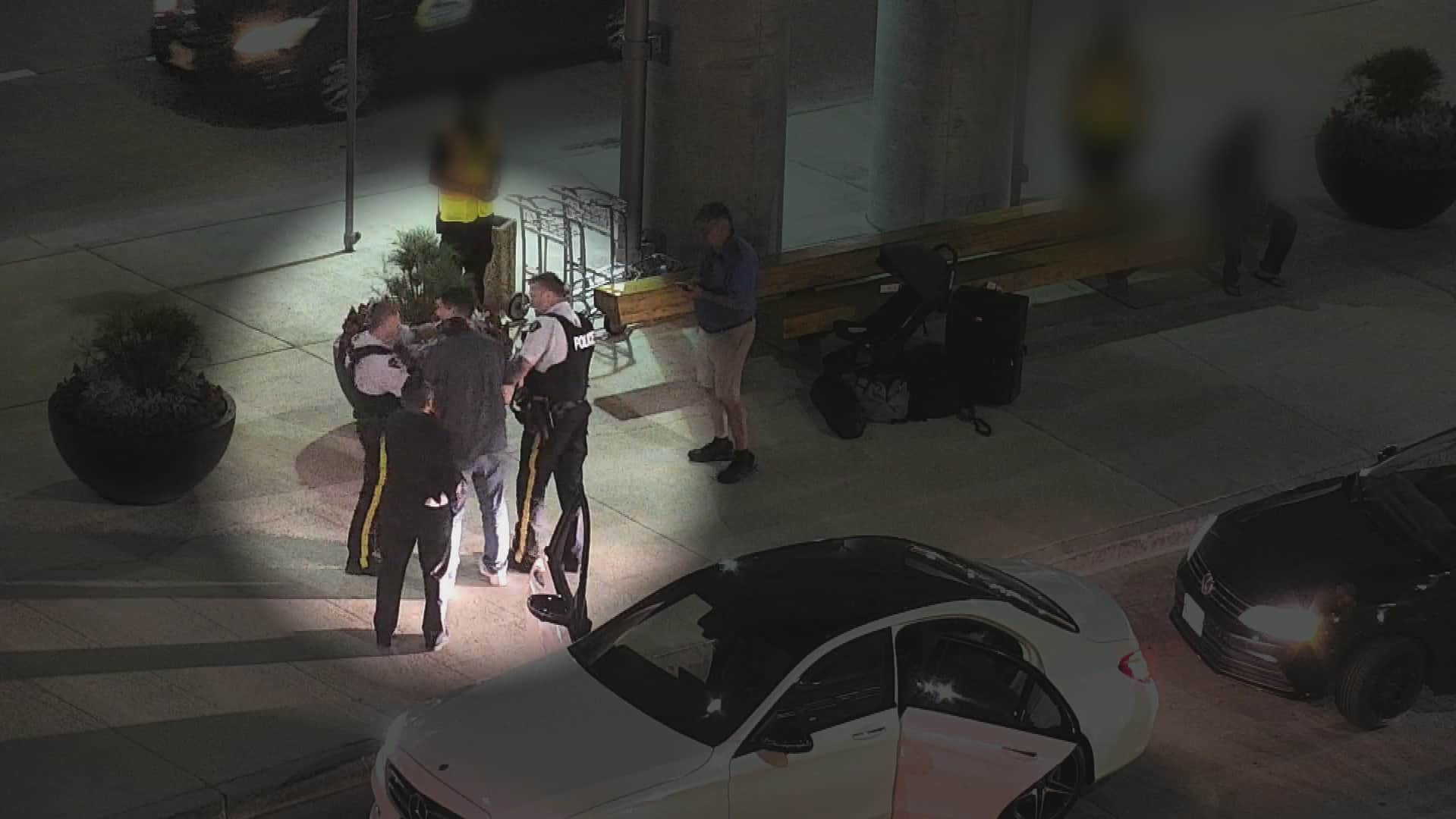The recent stay of an assault charge against a Mountie who put his knee on a man’s neck for more than three minutes during an arrest as the man cried “I can’t breathe” exemplifies unfair double standards that seem to be at play when police are accused of wrongdoing, says a law professor who studies officers charged with crimes.
“It signals to the public that police officers can act with a certain level of impunity,” said Danardo Jones, a criminal defence lawyer and assistant professor of law at the University of Windsor.
“It erodes trust in our criminal justice system. It erodes trust in the police.”
An assault charge against Manitoba RCMP Const. Eric Gerein was stayed on Nov. 3 following an incident at Winnipeg’s airport caught on cellphone video.
That Aug. 1, 2019, video showed Gerein kneeling on Nathan Lasuik’s neck and placing the man’s face against the ground during an arrest, as Lasuik pleaded with the officer to let him breathe.
Gerein was charged with assault in 2022 after the Independent Investigation Unit of Manitoba found there were reasonable grounds to believe a criminal offence had happened.
While the arrest was in August 2019, Mounties didn’t notify the police watchdog about it until more than two years later — after the video was entered as evidence during Lasuik’s trial.
WATCH | WARNING — this video may be disturbing to viewers:
Featured VideoManitoba RCMP detain a man who they say was intoxicated and combative outside the Winnipeg airport in 2019. Video of the arrest was played in court to argue that excessive force was used by RCMP against the man, who was detained and charged with several counts of assault.
Jones said he’s seen cases involving members of the public where “there was still an appetite” from the Crown to prosecute, even though they don’t appear to have any chance of ending in conviction.
They stand in stark contrast to cases like Gerein’s, Jones said, where prosecutors didn’t seem to have that same hunger.
“We want officers to be held to the same standard,” he said.
“That’s what my research advocates for. It’s not for officers to be treated, you know, harsher than the rest of us. It’s for officers to be treated the same way everybody else is treated.”
Crown’s reasons highlight double standard: prof
Prosecutors in Gerein’s case said there were two reasons they stayed the charge against him — meaning while it’s not dropped, it’s no longer proceeding through courts.
One was the judge in Lasuik’s own trial on assault charges had issues with his credibility. The other was that surveillance footage submitted as evidence showed Lasuik behaving aggressively before police took him to the ground.

Jones said that reasoning underscores his point.
“If those are the reasons they have, then they should be staying a lot of other charges against folks who are not police officers,” he said.
In 2021, Lasuik was given a conditional discharge and a year of supervised probation after pleading guilty to two assault charges and being found guilty of a third. The charges involved assaults against a man at the airport and both officers who responded to the incident.
But provincial court Judge Dave Mann also found Lasuik’s Charter right to personal security was violated during his arrest because of how long Gerein’s knee stayed on his neck — which one use-of-force expert at the trial testified was unnecessary and unjustified.
The judge also noted credibility issues with both Gerein — who told court he didn’t remember being recorded on cellphone video by Lasuik’s father, despite looking at the camera during the video — and with the other RCMP officer involved in the arrest, who said he didn’t hear Lasuik yelling he couldn’t breathe, despite the man’s repeated pleas for help.
Likelihood of conviction, public interest
When Manitoba prosecutors are deciding whether to stay a charge, they look at two things: first, whether there’s a reasonable likelihood of conviction, and second, whether there’s a public interest in prosecuting the case.
But they only consider that second question if they’re satisfied they’ve cleared the bar for the first one, said Brandon Trask, an assistant law professor at the University of Manitoba and former prosecutor.
Weighing the reasonable likelihood of conviction in a case is a practical question, but it also results in “all sorts of unfair situations” — like in domestic abuse cases where victims often recant their statements, said McGill University associate law professor Noah Weisbord.
But on the other hand, “it could never be in the public interest to prosecute a failed case,” Weisbord said.
“Imagine this is a very important case, really in the public interest, but to prosecute it would result in failure and acquittal. Then it’s terrible for the administration of justice.”

Weisbord said the Manitoba case is also an example of how “extremely difficult” it can be to convict a police officer of a crime.
“It shows the system is flawed. If such an obvious kind of use of really, potentially deadly force by the police officer … could be written off as being kind of impossible to prove beyond a reasonable doubt,” he said.
A nuanced question
Court heard in the hours before the incident, Lasuik — who has post-traumatic stress disorder and would self-medicate with alcohol to make flying easier — had the equivalent of four vodka shots and two tequila shots.
When he and his family walked out of the airport, Lasuik got into an altercation with another man who was parked behind their vehicle, and the situation escalated, with Lasuik seen in airport surveillance footage kicking and punching the other man.
Featured VideoThese two moments cut from more than 40 minutes of airport surveillance footage submitted as evidence at Nathan Lasuik’s trial show what happened before Const. Eric Gerein and another RCMP officer took Lasuik to the ground. During the arrest, Gerein put his knee on Lasuik’s neck for more than three minutes.
Lasuik testified the other man was threatening him and his children.
After RCMP arrived at the scene, Lasuik was seen at times to be acting combatively toward them in the more than 40 minutes of footage submitted as evidence — including when he suddenly hit Gerein in the face.
While people watching the video of the airport arrest might come to the conclusion Gerein used excessive force, the question that would have to be answered beyond a reasonable doubt by a court is more nuanced, said Robert Diab, a criminal defence lawyer and law professor at Thompson Rivers University in Kamloops, B.C.
“The court would ask, ‘Is there a reasonable possibility that it was not excessive?'” Diab said.
“Under reasonable doubt, you can be possibly guilty. That’s not enough. You can even be probably guilty, and that’s not enough. You have to be guilty beyond a reasonable doubt.”
Diab said based on the video in the case — which shows Lasuik acting erratically and violently before his arrest — he thinks there is also a basis for the officer to claim his actions were prompted by safety concerns.
“And to be clear, the police can be mistaken,” he said.
“He doesn’t have to be completely right as to whether the precise amount of force used was reasonable or excessive. There just has to be a possibility that he was right.”
Outside prosecutors needed: expert
For Trask, the concerns raised by Gerein’s case — from the Crown’s “lacking” explanation for staying the charge to perceptions that police are treated differently than others during prosecutions — suggest a need for change.
That could start with assigning prosecution of all police officers in Manitoba to private bar lawyers or attorneys outside the province.
“I think it’s important that we take steps to improve public confidence in the administration of justice,” Trask said.
“Even just this perception that there are different standards for police versus members of the public, that’s problematic. And I think steps need to be taken to remedy that going forward.”
A high-level prosecutor can be assigned to review cases involving police officers, a provincial spokesperson told CBC. They said that was done in Gerein’s case, given its “complexity and seriousness.”
The provincial spokesperson said the case was not sent to prosecutors for assessment of the charge before the police watchdog laid the charge.
The Independent Investigation Unit of Manitoba declined to comment on the case earlier this week, saying it will issue its final report on the incident when it’s complete.
This post was originally published on this site be sure to check out more of their content.









